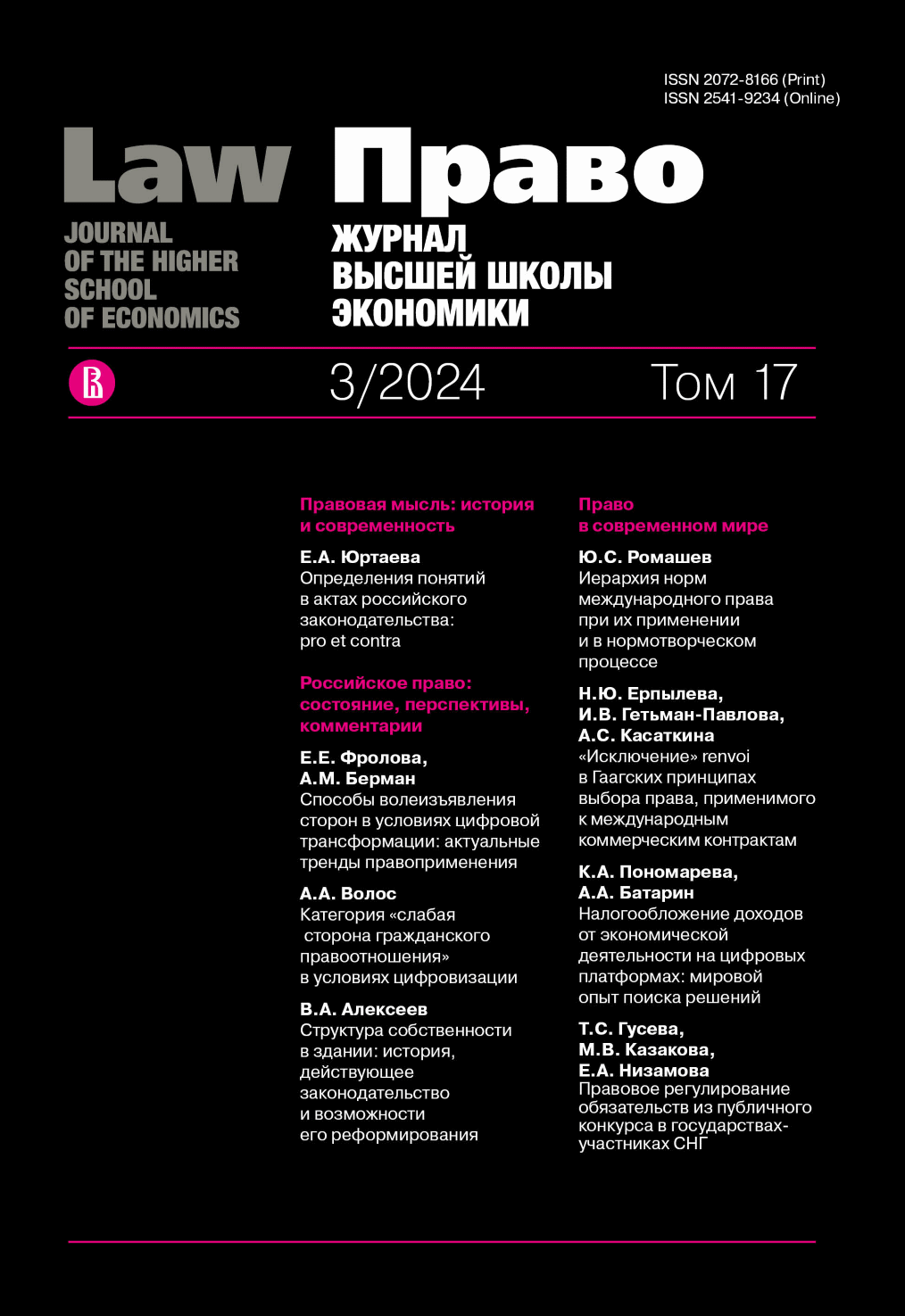Налогообложение доходов от экономической деятельности на цифровых платформах: мировой опыт поиска решений
Аннотация
Во многих странах мира приобретает все большую актуальность проблематика налогообложения доходов физических лиц от деятельности, при ведении которой они не имеют работодателя и не привлекают наемных работников по трудовым договорам. Особенно много нерешенных вопросов существует в части налогообложения граждан, осуществляющих экономическую деятельность с помощью цифровых платформ. Эта проблематика весьма актуальна и в России. Целью настоящей статьи является разработка предложений о совершенствовании налогового законодательства в части налогообложения доходов физических лиц от деятельности, которую они осуществляют с помощью цифровых платформ без работодателя и привлечения наемных работников по трудовым договорам. Предполагается разработать эти предложения в том числе на основании использования лучших практик. В статье рассмотрен зарубежный опыт налогообложения доходов лиц, ведущих экономическую деятельность с помощью цифровых платформ, а также опыт конструирования моделей налогового агентирования цифровых платформ в отдельных зарубежных странах и интеграционных объединениях; проведен анализ зарубежной практики налогообложения доходов физических лиц от деятельности без работодателя и наемных работников; сформулированы предложения о совершенствовании российского налогового законодательства. Поскольку в большинстве стран модели участия цифровых платформ в налоговых отношениях находятся в стадии формирования, российский законодатель сможет как использовать лучшие практики, так и учесть ошибки других государств и избежать конструирования моделей, в которых уже обнаружились недостатки. Отмечается, что в большинстве государств основное внимание уделяется проблематике косвенного налогообложения, в то время как вопросы налогообложения самозанятых, работающих с помощью цифровых платформ, пока практически не урегулированы. В ходе исследования авторы использовали формально-юридический и сравнительно-правовой методы.
Литература
Brogi E., Carlini R. (2021) Accelerating Adoption of a Digital Intermediary Tax. In: M. Moore and D. Tambini (eds.) Regulating big tech: policy responses to digital dominance. New York: Oxford University Press, pp. 127–148. DOI: https://doi.org/10.1093/oso/9780197616093.003.0008
Cicin-Šain N., English J. (2022) DAC 7: An Entire New Framework for Joint Audits in the EU: How Do the Taxpayers Fare? Intertax, vol. 50, no. 1, pp. 7–27. DOI: https://doi.org/10.54648/TAXI2022002
Grinberg I. (2018) User Participation in Value Creation. British Tax Review, no. 4, pp. 407–421.
Hayashi A.T., Kim Y.R. (2023) Taxing Digital Platforms. Virginia Journal of Law and Technology, vol. 26, no. 3, pp. 1–14.
Kordina I.V., Khlebovich D.I. (2021) Marketplace as a Business Model of E-Commerce. Izvestiya Baikal’skogo gosudarstvennogo universiteta=Bulletin of Baikal State University, 2021, vol. 31, no. 4, pp. 467–477 (in Russ) DOI: https://doi.org/10.17150/2500-2759.2021.31(4).467-477
Kraulin K.K. (2022). Limits of Product Liability of the Marketplace Owners in Russia and the USA. Cifrovoe pravo=Digital Law, no. 3, pp. 20–42 (in Russ.) DOI: https://doi.org/10.38044/2686-9136-2022-3-3-20-42
Mazhorina M.V. (2020) Cyberplace and Methodology of International Private Law. Pravo. Zhurnal Vysshey shkoly ekonomiki=Law. Journal of the Higher School of Economics, no. 2, pp. 230–253 (in Russ.) DOI: https://doi.org/10.17323/2072-8166.2020.2.230.253
Mironova S.M. (2023) Tax on Professional Income. Five years of the experiment: Interim Results. Finansovoe pravo=Financial Law, no. 9, pp. 2–6 (in Russ.)
Persiani A. (2023) DAC7: Some Thoughts on the Different Roles of Platform Operators and the Appropriate Definition of the Scope of Reporting Obligations. EC Tax Review, vol. 32, no. 4, pp. 163–171. DOI: https://doi.org/10.54648/ECTA2023021
Russo R. (2023) Introduction. Reflections about the Implications of Platforms and Technology for Taxation and Taxpayers’ Rights. In: D. Weber (ed.) The Implications of Online Platforms and Technology for Taxation. Amsterdam: IBFD, pp. 1–8. DOI: https://doi.org/10.59403/3r0nqgv001
Shatalov S.D. et al. (2024) Professional Income Tax: Discussion Issues from the View of the Subjective Composition of the Tax Regime. Vestnik Moskovskogo universiteta. Gosudarstvennyi audit=Bulletin of Moscow University. Government Audit, no. 1, pp. 34–45 (in Russ.) DOI: https://doi.org/10.55959/MSU2413-631X-27-15-1-03
Sidorenko E.L. (2022) Definition of “Digital Platforms”. In: The Platform Economy: Designing a Supranational Legal Framework. Singapore: Palgrave Macmillan, pp. 77–92. DOI: https://doi.org/10.1007/978-981-19-3242-7_6
Solodchenkova O.A. et al. (2023) Multicategory Marketplaces in Russia: Current Development Trends. Vestnik Altaiskoi akademii ekonomiki i prava=Bulletin of Altay Academy of Economy and Law, no. 1, pp. 135–140 (in Russ.). DOI: https://doi.org/10.17513/vaael.2681
Stevens S.A., van Wamelen J.T. (2021) The DAC 7 Proposal and Reporting Obligation for Online Platforms. EC Tax Review, vol. 30, no. 1, pp. 24–30. DOI: https://doi.org/10.54648/ECTA2021003
Tikhonova A.V. (2021) Key Issues of Taxing Self-employed in CIS Countries. Finansovyi zhurnal=Financial Journal, vol. 13, no. 6, pp. 81–97 (in Russ.) DOI: https://doi.org/10.31107/2075-1990-2021-6-81-97
Vartašová A., Cervena K., Olexova C. (2022) Taxation of Accommodation Services Provided in the Framework of the Collaborative Economy in the Slovak Republic. In: Proceedings of the 5th International Conference on Tourism Research. Reading (Mass.): Academic International Conferences Ltd., pp. 433–440. DOI: https://doi.org/10.34190/ictr.15.1.108
Copyright (c) 2024 Пономарева К., Батарин А.

Это произведение доступно по лицензии Creative Commons «Attribution-ShareAlike» («Атрибуция — На тех же условиях») 4.0 Всемирная.


















